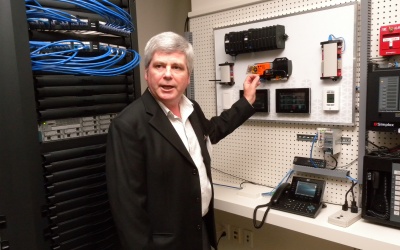Cisco Canada has opened an intelligent building integration centre in downtown Toronto for organizations to test supplier solutions using the network equipment maker’s technology before putting them into offices across the country.
It’s merely a room on the 35th floor of Cisco’s Toronto headquarters with a rack server and building control systems on the wall. But Cisco intends to make it an important part of its expansion into its so-called smart and connected communities strategy.

The goal it to convince governments and the private sector to get their systems to work together to create smarter institutions.
At a base level, Cisco [Nasdaq: CSCO] is working with real estate developers, landlords and building infrastructure makers to get components like IP-based lighting, ventilation and telephony systems inside individual buildings to work together. More broadly, Cisco hopes to connect networks within municipalities together to create what it calls smart cities.
Cisco says among its goals is to help organizations and governments deliver better innovation and productivity, but it also admits that it hopes to get a piece of the network infrastructure spending developers and governments are putting out.
One of the reasons the seminar is being held here is Cisco believes its involvement in Waterfront Toronto is one of eight “iconic” intelligent projects it is involved in around the world. A revitalization of part of the city’s lakeshore to house 115,000 people, it will include gigabit Ethernet connectivity to every residence for a converged Internet, voice and television access. Other projects it sees as landmark — not all of which are completed — are in Rio De Janero, London, Moscow, Barcelona, South Korea and Australia.
During the seminar Cisco will be taking reporters to see several of the Toronto projects its involved in. They represent individual building successes and not the city-wide integrated networks its vision encompasses. But in an interview, Cisco Canada president Nitin Kawale said the company wants to show “what’s in the realm of the possible”
Anil Menon, president of Cisco’s global smart communities unit based in Bangalore, India, said by videoconference that one way his company is making progress is by partnering with “forward-looking developers.”